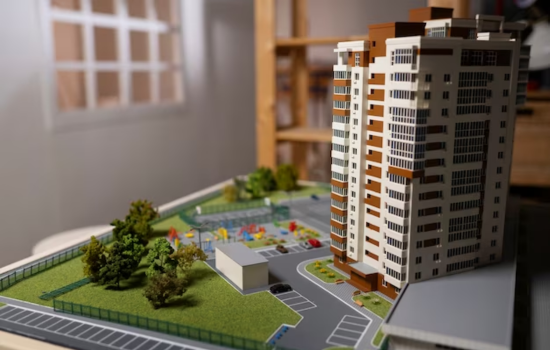Choosing between condominiums (condos) and apartments can considerably affect your home lifestyle. The decision, however does not end with square footage, but rather it penetrates into the finer details of ownership, customization and lifestyle.
If you’re on the verge of major life decisions or merely interested in learning more about the varied world, this blog will guide you regarding important characteristics that separate condos from apartments to reveal how they can create a home. Let us first understand what is the basic difference between condos and apartments.

Condominium
What is a Condominium?
Condos are units of the residential type located within a larger structure or compound. Condos, unlike standard apartments, are owned privately. In each condo, one individual owns it; thus, the owner determines what to do with the property.
As condo owners, they also become members of a homeowners’ association that maintains the communal spaces and upkeep of the structure.
What is an Apartment?
An Apartment is a rental space in an entire building or neighborhood. As a rule, one company or landlord owns the entire building. Tenants lease apartments and pay monthly rent for dwelling in the unit.
Unlike condo renters, Apartment Tenants cannot own their units and have less freedom to make structural changes or change the property. Property management is responsible for the maintenance, repairs, and management of the entire building.
5 Key Difference Between Apartment and Condo

condo condominium
Condos and apartments are sustainable housing options, but they differ in various aspects, such as ownership structure, customisation, modification, monthly costs, etc. Let us understand and elaborate on these major differences between condos and apartments to decide which one is most suitable for you:
1. Ownership Structure
- Condos: Condo units are individually owned. They can customize their units and manage the property. They also have a proportion of the common, which is through homeowners associations.
- Apartments: Unlike condominiums, the ownership of apartments is centralized under one entity, with tenants taking up units without owning them. They, as renters, are given temporary ownership of the space but do not have adequate control over the property.
2. Customization and Modifications
- Condos: Some of the decisions condo owners make are renovation and interior modifications or additions. Nevertheless, any amendments to the outer framework might be subjected to the approval of the homeowner association.
- Apartments: On the other hand, Residents of Apartments are confined to a very limited range when it comes to customisation. Most changes in the basic structure of the apartments are not allowed, and any modifications may need approval from property management.
3. Monthly Costs and Fees
- Condos: Condo owners pay monthly mortgage bills and property taxes and arrange HOA dues. These charges include the collective costs of maintenance, insurance and amenities.
- Apartments: An apartment tenant pays a fixed amount of rent for the amenities available, such as a swimming pool, gym, etc. Other costs, such as maintenance and real estate taxes, are covered either by the property owner or through a management company.
4. Investment Potential
- Condos: Most people perceive condos as real estate property investments. The value of the property is likely to appreciate over time, and owners can rent out their units so that they get rental income.
- Apartments: Renting an apartment gives one temporary accommodation, but renting is not capitalizing on a house. The opportunity to build equity is curtailed for tenants residing in apartments.
5. Resale and Exit Strategies
- Condos: Condo owners can sell their units in the real estate market. The resale value depends on location, market trends and property condition.
- Apartments: Apartment inhabitants have no unit ownership, resulting in a lack of opportunity to sell the property. In contrast, they can decide not to renew the lease when it is due for expiration.
Decoding the Difference Between Condos and Apartments With Citadel Property Management Corp.

Apartments With Citadel Property Management
The difference between condos and apartments is a critical focus point in the quest to find that ideal home. The choice is not about what to select, but it posits deeper questions of property ownership and degrees of style as well as type.
In terms of the benefits that can be enjoyed, condos give one ownership and customisation, while apartments offer convenience. The potential help in selecting either a condo or apartment could be solved by Citadel Property Management Corp. Get in touch with the experts today and begin your journey towards your dream home.
FAQ
1. What is the difference between a condo and a townhouse?
A townhouse is a multi-storied apartment building unit and may have separate entrances to the units or one common for all. Even though condos are located in townhouse buildings, there is an important difference when it comes to ownership. A condo involves individual ownership, but the townhouse can be individually owned or part of a homeowner’s association.
2. What holds greater investment potential in New York City – Condominiums or Apartments?
Investment potential is determined by some factors, not only current market trends but also location and personal preferences as well. Both condos and apartments provide some worthwhile benefits, with ownership of the premises for a condo, whereas flexibility is possible in an apartment. Asking for advice from an expert in real estate can assist with making a more informed decision specifically tailored to its purpose.
3. How do ownership structures differ between condos and apartments?
Condos include individual ownership of units, allowing owners to make decisions about their property. On the other hand, apartments are typically owned by a single entity, and tenants pay rent for the right to live in the space without owning it.



